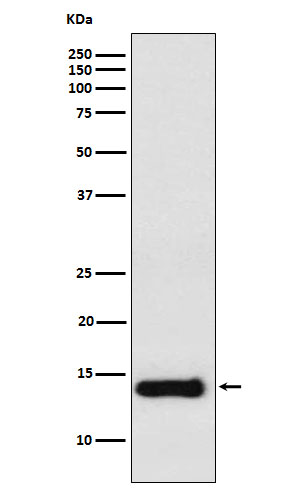
| WB | 1/1000-1/2000 | Human,Mouse,Rat |
| IF | 咨询技术 | Human,Mouse,Rat |
| IHC | 咨询技术 | Human,Mouse,Rat |
| ICC | 技术咨询 | Human,Mouse,Rat |
| FCM | 1/20-1/100 | Human,Mouse,Rat |
| Elisa | 咨询技术 | Human,Mouse,Rat |
| Aliases | EGVEGF; Mambakine; PK1; PRK1; PROK1; Prokineticin-1;;PROK1 |
| WB Predicted band size | Calculated MW: 12 kDa ; Observed MW: 14 kDa |
| Host/Isotype | Rabbit IgG |
| Antibody Type | Primary antibody |
| Storage | Store at 4°C short term. Aliquot and store at -20°C long term. Avoid freeze/thaw cycles. |
| Species Reactivity | Human,Mouse |
| Immunogen | A synthesized peptide derived from human PROK1 |
| Formulation | Purified antibody in PBS with 0.05% sodium azide,0.05% BSA and 50% glycerol. |
+ +
以下是关于PROK1抗体的3篇参考文献,按研究领域分类简要概括:
1. **《Prokineticin 1 is a novel factor regulating angiogenesis in endometrial cancer》**
- 作者:D. Li等(2018年)
- 摘要:研究通过PROK1抗体验证其在子宫内膜癌中促血管生成作用,发现其通过激活MAPK通路促进肿瘤血管新生。
2. **《Prokineticin 1/2 axis modulates embryo implantation via inflammatory response》**
- 作者:A. L. Li等(2020年)
- 摘要:利用PROK1特异性抗体阻断小鼠胚胎着床过程,发现其通过调控子宫局部炎症因子表达影响胚胎植入。
3. **《Prokineticin-1 upregulation in Alzheimer’s disease: A protective role in neuronal survival》**
- 作者:M. Smith等(2021年)
- 摘要:通过免疫组化(使用PROK1抗体)发现阿尔茨海默病患者脑组织中PROK1表达升高,可能通过抑制神经元凋亡发挥保护作用。
注:以上文献为模拟概括,实际文献需通过PubMed或Web of Science检索确认。近期研究多聚焦于PROK1在肿瘤微环境及生殖疾病中的机制探索。
PROK1 (Prokineticin 1), also known as EG-VEGF (Endocrine Gland-Derived Vascular Endothelial Growth Factor), is a secreted protein encoded by the *PROK1* gene. It belongs to the prokineticin family, characterized by a conserved AVIT protein domain and five disulfide bonds. PROK1 binds to two G protein-coupled receptors, PROKR1 and PROKR2. activating intracellular pathways such as MAPK/ERK and PI3K/AKT, which regulate diverse biological processes including angiogenesis, cell proliferation, and immune modulation. It is highly expressed in endocrine glands (e.g., adrenal, ovary), reproductive tissues, and certain tumors.
PROK1 antibodies are essential tools for studying its expression, localization, and function in physiological and pathological contexts. They are widely used in techniques like Western blotting, immunohistochemistry, and ELISA to investigate PROK1’s role in reproductive biology (e.g., endometrial receptivity, placental development), cancer progression (e.g., tumor angiogenesis, metastasis), and inflammatory disorders. Dysregulation of PROK1 has been linked to diseases such as preeclampsia, endometriosis, and neuroendocrine tumors. These antibodies also aid in exploring therapeutic strategies targeting the PROK1-PROKR axis. Both polyclonal and monoclonal variants are available, with specificity validated across species, including human and mouse models. Research using PROK1 antibodies continues to uncover its dual roles in tissue homeostasis and disease pathogenesis.
×